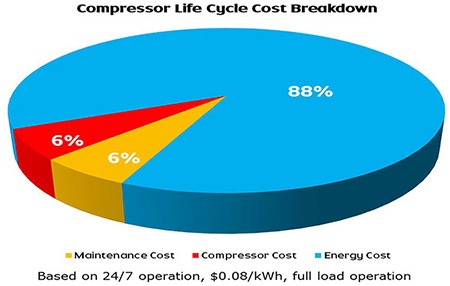If an owner chooses a used compressor, it can have a significant impact on energy costs. The reduced energy efficiency of a used compressor may lead to annual expenses amounting to tens of thousands of dollars in electricity usage to keep the unit operational. These ongoing costs can erode the initial savings achieved in the purchase price within just a few months, and they will continue to accumulate over time. It’s even possible that by the time the compressor reaches the end of its lifespan, the accumulated energy expenses alone may exceed the entire cost of acquiring the compressor!
When purchasing a compressor, you should try to find a balance between the upfront purchase cost and the long-term associated energy and maintenance costs, though of course the final decision is dependent on your business’ unique needs and requirements.

- Uncertain History: With a used compressor, you often don’t have a clear picture of its maintenance history or how it was used by the previous owner. This uncertainty can lead to unexpected issues and repair costs.
- Higher Maintenance Costs: Older compressors may require more frequent maintenance and repairs, increasing the overall cost of ownership compared to a new compressor with a warranty.
- Reduced Efficiency: Used compressors may be less energy-efficient than newer models, resulting in higher operating costs over time, increased energy bills and reduced compressed air.
- Limited Lifespan: Used compressors typically have a shorter remaining lifespan compared to new ones, potentially requiring replacement sooner than expected.
- Availability of Replacement Parts: Older compressor models may have discontinued or hard-to-find replacement parts, leading to extended downtime during repairs.
- Compliance Issues: Older compressors may not meet current environmental regulations and emissions standards, potentially leading to compliance issues and fines.
- Lack of Warranty: Used compressors often come with limited or no warranties, leaving you responsible for repair costs shortly after purchase.
- Risk of Hidden Issues: There may be hidden or undisclosed problems with a used compressor, such as worn-out components or leaks, which can be costly to address.
- Limited Customization: Used compressors may not offer the level of customization and features available with new models, limiting their suitability for specific applications.
- Lower Resale Value: As a used compressor continues to age, its resale value may decline significantly compared to a new compressor.
- Availability and Reliability: Finding a trustworthy source for a quality used compressor can be challenging, and you may not have the same level of confidence in its reliability as with a new unit.
- Compliance with Regulations: Older compressors may not meet current environmental regulations and emissions standards, potentially leading to compliance issues

